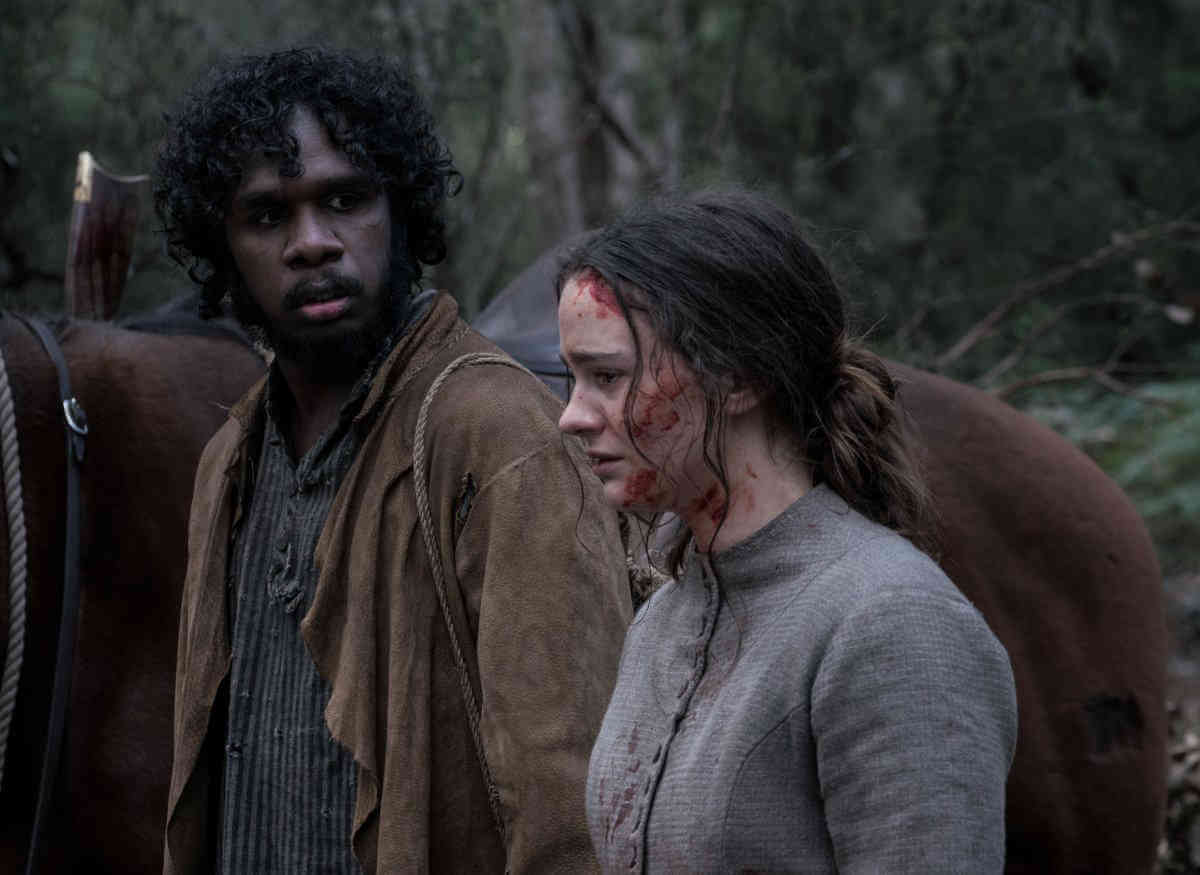I admire Australian director Jennifer Kent’s refusal to follow up her 2014 debut “The Babadook” by going to Hollywood and rebooting an ‘80s horror film. Her second film, “The Nightingale,” tries hard to be as bleak as possible, but winds up feeling rather one-note. Set in 1825, it depicts Australia’s colonial period as an orgy of rape and murder committed by white men as casually as they put their clothes on. The Babadook went from a supernatural villain to a “gay icon” via a mistake on Netflix’s website and the magic of ironic memes. That’s not going to happen with “The Nightingale.”
Having been a convict since she was 14, the Irish-born Clare (Aisling Franciosi) yearns to escape Lieutenant Hawkins (Sam Claflin.) Although she’s married to Aidan (Michael Sheasby), Hawkins and his underlings treat her as an object. (She gets raped three times in the film’s first half hour.) Something happens to change this situation, sending Clare on the run in pursuit of Hawkins. No white men will serve as her guide, so she hires Billy (Baykali Ganambarr), a young Aboriginal man. As she pursues a private vendetta, the white colonizers of Australia are trying to kill off as many Aboriginal people as they can.
The last two hours of “The Nightingale” take place in the outdoors, except for a brief stretch near its end. Kent shot most of the film in verdant forest, but she avoided framing it to look pretty. Radek Ladczuk’s cinematography is misty and dark. The narrative’s bleak mood is conveyed through the film’s look as well. It was shot in a 1.33 aspect ratio, which makes close-ups seem even tighter and long shots smaller, and even its lengthy running time conveys a feeling of being trapped alongside Clare on her desperate journey.
“The Nightingale” emphasizes the pain of violence. When Clare is raped for the second time, we see a close-up of her crying face. (This scene becomes even more disturbing because we can also hear her baby in the background.) But the only predictable thing about the film’s violence is that it’s a constant. Australian soldiers murder children just for annoying them. They kill Aboriginal men simply for existing.
Franciosi’s performance isn’t interested in making Clare “likable.” Her face is often a blank slate, whose only emotions are pain and anger. Forced into being a “nightingale,” a pretty singer who serves at Hawkins’ beck and call, Clare finds power in rejecting that role. But she’s the only character in the film who feels fully realized. Her relationship to Billy begins with an antagonism that would be funny if their circumstances weren’t so dangerous — he tells her how much he hates the English, she responds that she’s Irish and hates them, as well, and he moves on to anger against white people in general. But it turns into something close to a standard interracial buddy story.
In the past two years, women have directed a small pool of films grappling with sexual violence, sometimes explicitly: Vivian Qu’s “Angels Wear White,” Jennifer Fox’s “The Tale,” Mouly Surya’s “Marlina the Murderer In Four Acts,” Coralie Fargeat’s “Revenge,” and Isabella Eklof’s “Holiday.” Kent began talking about the ideas behind “The Nightingale” while still doing press for “The Babadook,” but it emerges into a world where the extent of sexual assault committed by powerful men in politics and the film industry has been revealed. The history of films about women seeking revenge on their rapists, usually directed by men, goes back decades before #MeToo. And more so than any of the films just named, “The Nightingale” falls into some of their pitfalls.
The press kit for “The Nightingale” took the unusual step of beginning with a paragraph-long trigger warning and statement ending, “While art can make viewers uncomfortable, it can also inspire reflection on the importance of empathy for our survival.” The fact that some Aboriginal spectators have blasted the film for introducing indigenous characters only to kill them off 30 seconds later obviously made Kent feel defensive. And, in fact, Clare uses Billy to serve her ends with little concern for his safety.
Another problem with the film is that its violence is committed entirely by men who act like one-dimensional mustache-twirling villains. In the real world, men who can be charming and loving are also capable of rape; if that weren’t the case, the crime would be far easier to avoid.
Kent’s film dives into excess and pain, setting itself up as the story of the founding of Australia. In attempting to engage with an unpalatable historical reality, “The Nightingale” actually feels like an update of a ‘70s exploitation movie (something “Revenge” succeeded much better at being thanks to its self-awareness.) Without having seen the film, an acquaintance likened it to a cross between “I Spit On Your Grave” and “Driving Miss Daisy” on Facebook, and that’IFC Fs harsh but accurate. The more it refuses to offer any solace or relief, the further away from real life it feels.
THE NIGHTINGALE | Directed by Jennifer Kent | IFC Films | In English and Gaelic and palawa kani with English subtitles | Opens Aug. 2 | IFC Center, 323 Sixth Ave. at W. Third St. | ifccenter.com
































